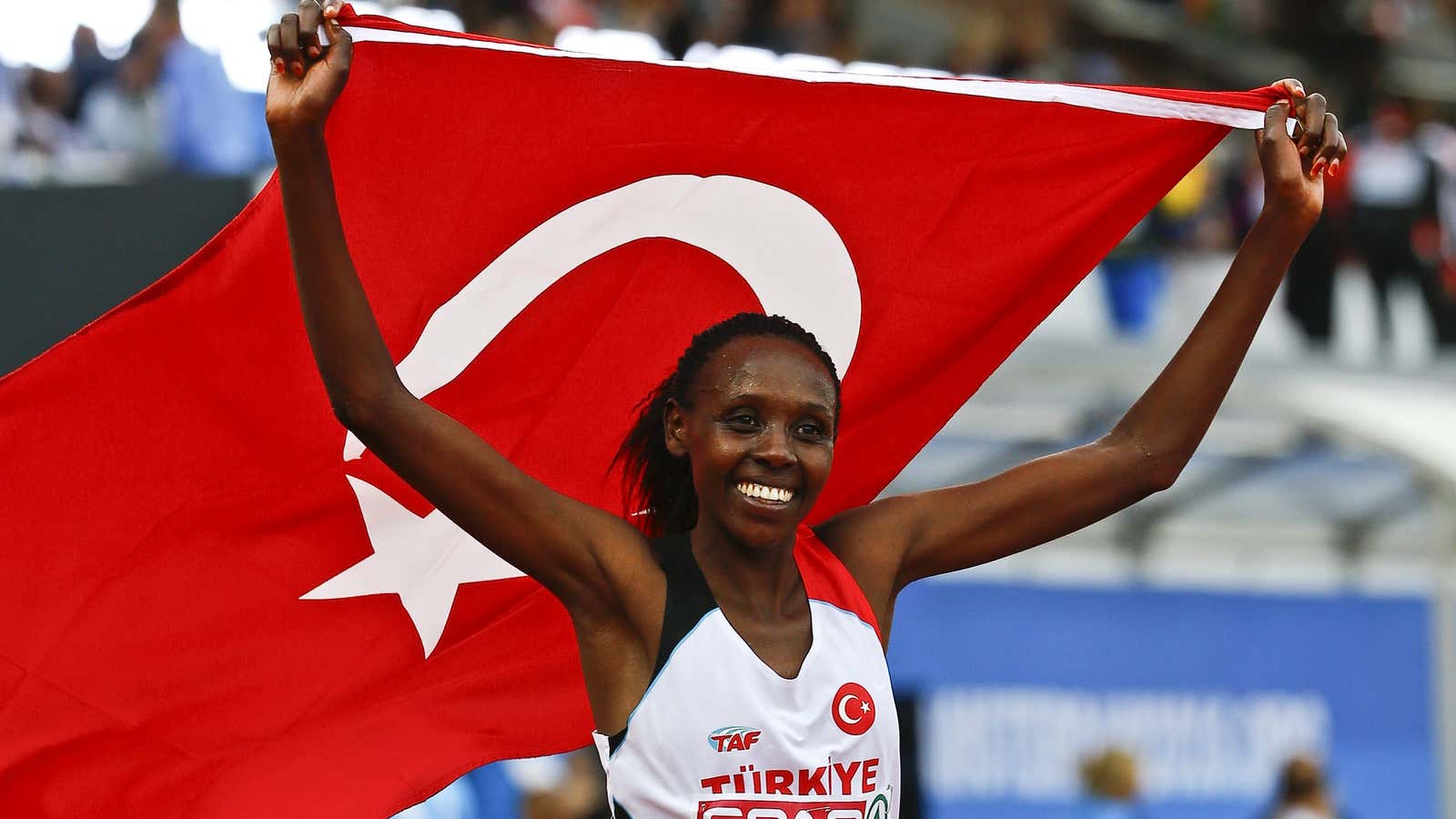Last month, Yasemin Can, a Turkish athlete made mincemeat of her opponents to clinch both the 5,000m and the 10,000m races at the European Championships in Amsterdam. The 19-year old, born in Kenya as Vivian Jemutai, is one of the many African athletes who will be a force to reckon with as they represent their adopted nations when the track & field events kick off this weekend.
Kenya and Ethiopia are celebrated in the middle and long distance races while their counterparts in Nigeria usually put up decent performances in the sprints. About 20 Kenyan-born athletes will represent their adopted nations at the three-week sporting extravaganza, battling it out mostly for the 1,500m, 3,000m steeplechase, 5,000m and 10,000m races.
Asia’s fastest man, is the Nigerian-born Femi Ogunode running for Qatar and another Nigerian-born runner, Ezinne Okparaebo will fly Norway’s flag in the 100m race. Kemi Adekoya and Abubakar Abbas, other Nigerian exports, will represent Bahrain in the 400m race. Bahrain will equally have seven Ethiopian adoptees in Rio.
The switch
Switching nationalities is nothing new in the world of athletics. Many reasons are given for the switch in allegiance. One of them is the stiff competition at home that has seen many athletes opt to find an opportunity elsewhere, where they are also duly recognized and rewarded by their adopted nations. But, it’s how the sport is managed locally is the single biggest cause of endless exodus.
In many African countries, the sports industry is beleaguered by poor management, inefficiency, corruption and discrimination (pdf). In Nigeria, for instance, athletes have not only complained about second-rate training facilities but also expressed frustration at lack of after-injury support. One high-profile example was Francis Obikwelu after he got injured competing for his country Nigeria at the Sydney Olympic in 2000. Neglected by the the Nigerian athletics body, Obikwelu switched nationalities in favor of Portugal. Coming from an injury, he went on to win a silver medal for Portugal at the 2004 Athens Olympic, setting a European record of 9.86 seconds. More recently, Nigerian athletes had been asked to find their own private means to Rio, but the Athletics Federation of Nigeria later backtracked after a social media backlash.
Nigeria’s Ogunode termed his move to Qatar as the best career decision he ever made after facing frustration back home by acts of nepotism and corruption in Nigerian athletics. In Ethiopia, cases of discrimination along ethnic lines have surfaced in the athletics administration. More recently, iconic athlete Haile Gebrselassie decried the poor management of the country’s athletics federation in the selection of a team that would represent the nation in Rio Olympics. His comments followed the exclusion of Kenenisa Bekele, the 2004 and 2008 Olympic 10,000m champion from the team by the Ethiopian Athletics Federation. Bekele, an Oromo, had made a comeback from an Achilles tendon injury that put him out of competition in 2015.
Some athletes have equally dumped their born country to avoid persecution by the government of the day on accusations of spreading propaganda or conspiring against the state. With Ethiopia continuing to see human rights abuses, many athletes, especially from the Oromo ethnic group often report being arrested and persecuted by officials on suspicion of supporting the Oromo Liberation Front, an armed separatist group claiming the Oromo are denied basic human rights by the authorities. There were claims that Bekele was excluded because he is from the Oromo, which has had bloody confrontations with the Ethiopian government in recent times.
Kenya has recently been fighting off a string of corruption scandals and allegations of attempting to subvert an anti-doping control process. The IAAF’s ethics commission would later suspend three top officials “in the interests of the integrity of the sport”.
